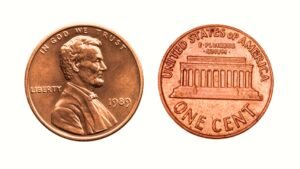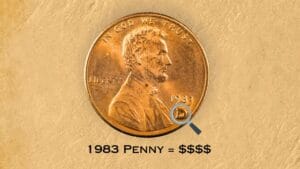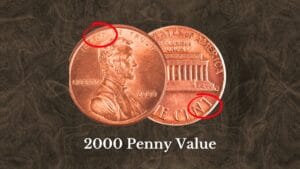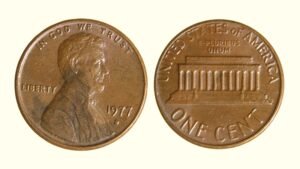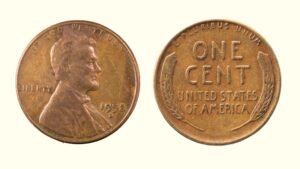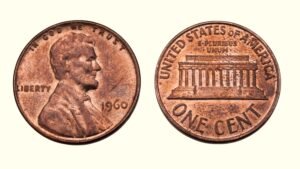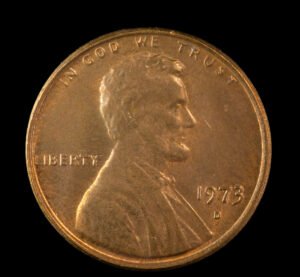Did you know the old 1966 Lincoln penny in your change jar can sell for jaw-dropping amounts today, like the one that fetched a stunning $6,462 at auction? This value guide will walk you through the rare features, elusive errors, and other features that could turn your small 1966 copper cent into a goldmine!
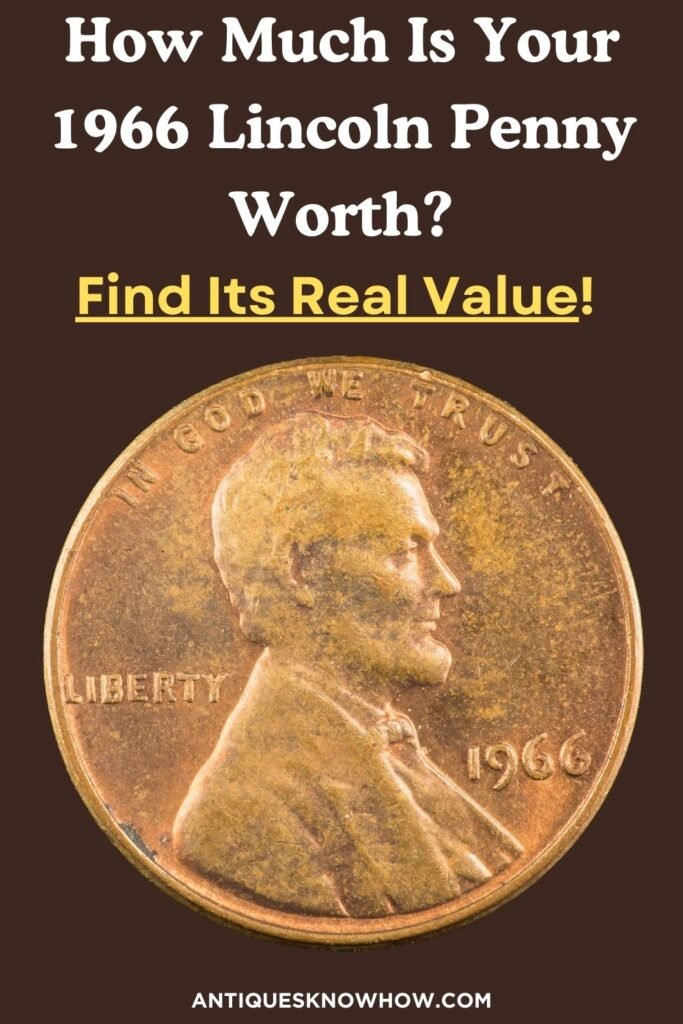
The average value of a circulated 1966 Lincoln penny ranges from around 1 to 5 cents, while that of uncirculated examples can reach up to several hundred to thousand dollars, depending on its condition and any unique features it may possess.
Brief History of 1966 Lincoln Memorial Penny
The Lincoln penny, first minted in 1909, commemorates President Abraham Lincoln, America’s 16th president. By 1966, the design had undergone minor changes, like changing the reverse design from wheat to Memorial, but its core features and composition remained unchanged.
The United States Mint produced all the pennies without any mint mark. Besides, instead of proof cents, the Mint released SMS or Special Mint Set coins. Despite being produced in massive quantities of over 1.5 billion coins, these are considered valuable pennies due to their rare flaws and features!
| 1966 Lincoln Wheat Cent | Key Features & Facts |
| Coin Composition | 95% Copper, 5% Tin and Zinc |
| Minting Location | Philadelphia, Denver, San Francisco |
| Minting Year | 1966 |
| Face Value | 1-cent (0.01$) |
| Weight | 3.11 grams |
| Diameter | 19.05 mm |
| Thickness | 1.52 mm |
| Designer | Victor David Brenner, Gilroy Roberts |
| Mint Marks | No Mint Marks |
| Total Mintage | 3,050,530,444 |
Identifying a 1966 Lincoln Penny Design & Composition
To find the value of your 1966 Lincoln penny, the first step is to understand its design, composition, dimensions, and other physical characteristics.
1966 Lincoln Penny Obverse:
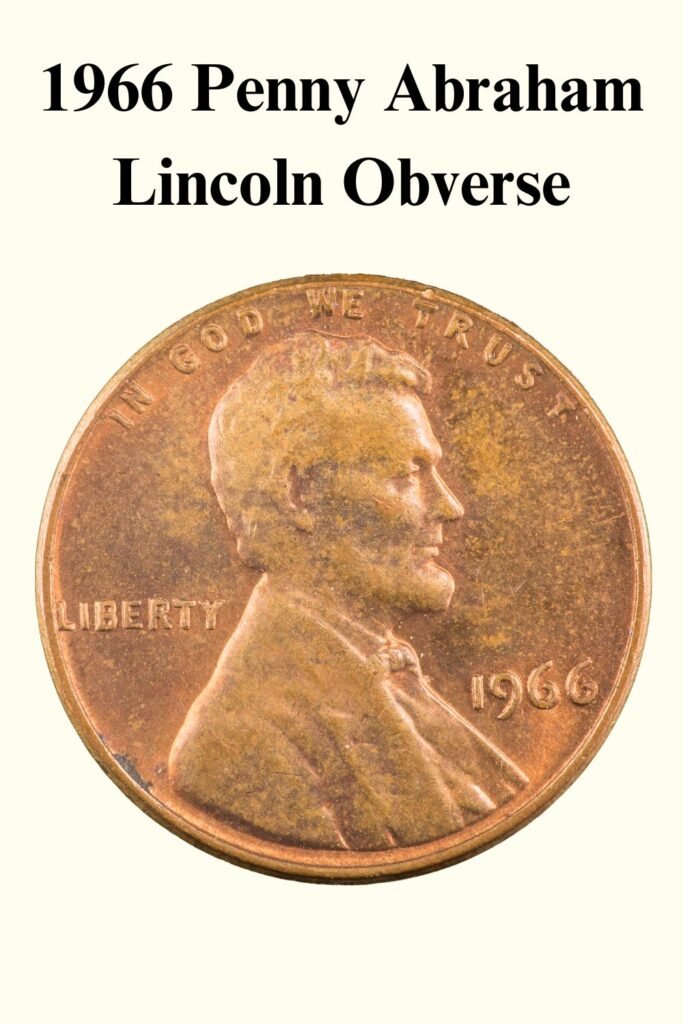
- A right-facing portrait of Abraham Lincoln
- The word ‘LIBERTY’ on the left side, in compact kerning
- The minting year “1966” on the lower right
- The phrase “IN GOD WE TRUST” on the top
1966 Lincoln Penny Reverse:
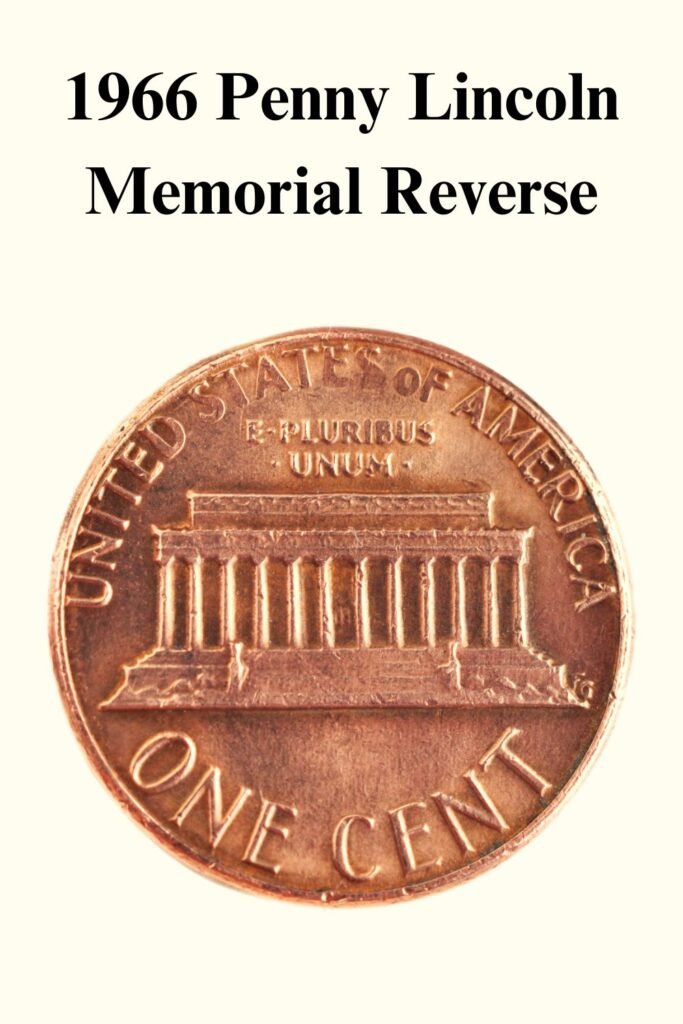
- The picture of the Lincoln Memorial building with 12 columns, steps, and plinth
- “UNITED STATES OF AMERICA” on the top
- The denomination, “ONE CENT,” at the bottom
- The US motto, “E PLURIBUS UNUM,” above the hall
- The designer’s initials “FG” for Frank Gasparro to the right of the hall’s stairs
Coin Composition, Size & Dimensions
The 1966 Lincoln penny is composed of 95% copper and 5% zinc, maintaining traditional materials used since its inception. This unique composition gives the small cent its distinctive copper-red luster and specific weight of 3.11 grams or 0.110 ounces.
The diameter of the 1966 penny is around 19.05 millimeters or 0.75 inches, and its thickness is 1.52 millimeters or 0.059 inches. Lastly, the small cent features a uniform, smooth edge.
To ensure a 1966 Lincoln cent is real, it’s important to verify its composition and measure its weight and size precisely. If the numbers don’t match the above details, it could be a counterfeit.
How Much Is Your 1966 Lincoln Cent Worth? (5 Key Factors)
| Coin Grades | 1966 No Mint Mark Penny Value |
| Poor (0) to Extremely Fine (XF45) | Face Value |
| Almost Uncirculated (AU50) to Mint State (MS60) | 30 to 50 cents |
| Mint State (MS61 – MS64) | $1 – $8 |
| Mint State (MS65 – MS66+) | $10 – $40 |
| Mint State (MS67 – MS67+) | $300 – $6,000 (More for MS67+) |
| Mint State (MS68 or Above) | N/A |
The value of an old 1966 Lincoln fluctuates based on several factors, including rarity, condition, special features, and errors.
1. Coin Grading and Condition
Your 1966 Lincoln penny’s condition plays the most important role in determining its value. The condition is graded on a scale from P-1 to MS-70, wherein MS grades indicate a coin in the flawless, uncirculated condition.
A higher-grade 1966 Lincoln cent in Mint State condition is significantly worth more than that with wear or damage. For example, a red 1966 1C MS67RD coin sold for a staggering price of $6,462 at Heritage Auctions, while the same coin in MS65 grade is only worth $10-$20.
2. Coin Color & Toning of 1966 Lincoln Penny
The color of a coin, which generally changes due to oxidation and toning over time, can significantly impact its value. Generally, Lincoln pennies can exhibit three primary colors:
- Red (RD): Red 1966 pennies retain their original copper luster. Depending on the grades, red coins can command high values ranging from $5 to $1,600 in mint state.
- Red-Brown (RB): These cents display a mix of red and brown hues, indicating minimal wear or aging. In an uncirculated state, RB 1966 cents can fetch $1 to $10.
- Brown (BN): Pennies that have oxidized completely are graded Brown. Due to their worn-out condition, BN 1966 cents are generally worth only their face value.
3. 1966 Lincoln Penny Mint Marks & Mintage
The 1966 Lincoln penny was minted in three locations: Philadelphia, Denver, and San Francisco, each with a different mintage.
Here are the actual mintage figures of the 1966 Lincoln Memorial Penny:
- 1966 No Mint Mark Lincoln Penny – 811,100,000
- 1966 D Lincoln Penny – 991,431,200
- 1966 S Lincoln Penny – 383,355,000
- 1966 S Lincoln Penny SMS – 2,261,583
However, none of the 1966 pennies produced at any location bear any mint mark, which makes identifying a 1966 penny struck in Philadelphia or any other location nearly impossible. That’s why all the 1966 cents are valued similarly, despite the location where they’re produced!
4. 1966 S Lincoln Penny SMS Coins
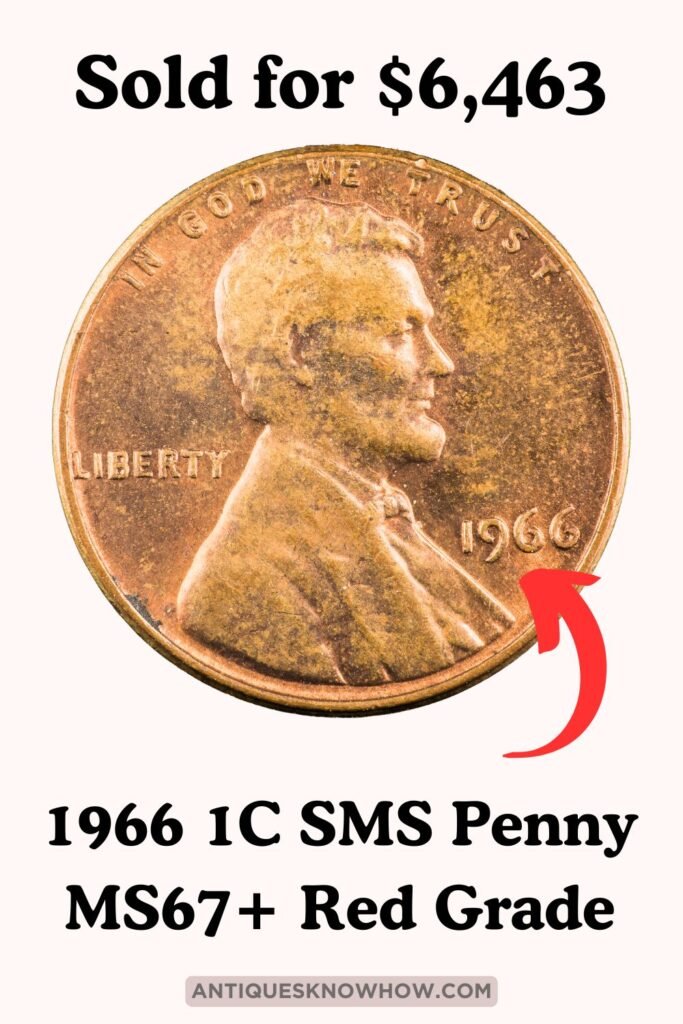
Like previous years, the U.S. Mint released the Special Mint Set (SMS) cents in 1966 for collectors instead of proof coin sets. While 1966 1C SMS coins also have no mint mark, they feature a unique satin finish with a frosted appearance and sharp details, setting them apart from standard circulation coins.
The value of a regular red 1966 SMS penny ranges from $7 to $250 for SP60 to SP68 grades, with SP69 examples reaching $860 or more. Re-Brown SMS cents are worth $7 to $55, while brown SMS pennies are valued even less.
Apart from the three color categories, the 1966 SMS pennies have two other categories, like proof coins:
- Cameo: These SMS coins feature subtle contrast between raised designs and mirror-like fields, making them rarer and more collectible. Their values can range from $20 to $2,500 or more, depending on grades.
- Deep Cameo: DCAM SMS 1966 pennies have an even stronger contrast between raised devices and backgrounds. These coins can also fetch thousands in high grades, though there have only been a few, or most likely only one such coin graded as of now!
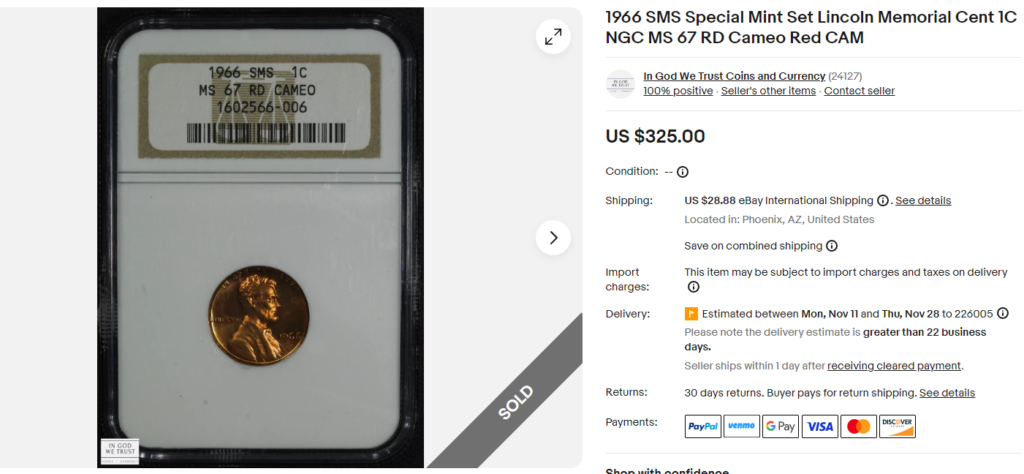
5. 1966 Lincoln Penny Errors
Minting errors can also increase a regular 1966 penny value. But not all errors are valuable. Here are some of the notable 1966 penny errors to look out for!
Struck on a 1966 Dime
When a 1966 penny is struck with an existing 1966 dime, the result is a rare coin with an overlapping clad coin with dime and penny features. An MS-65 example of a 1966 Lincoln Cent Struck on a 1966 Dime sold for over $630 on Heritage Auctions!
Doubled Die Obverse (FS-101)
This error caused doubled lettering or Lincoln’s design on a 1966 penny obverse due to a doubled die. The value of this error coin ranges from $20 to $50, depending on the doubling degree and coin’s condition, with prominent examples reaching $150 or more.
For example, a DDO 1966 penny in MS63RB grade sold for $154 in a coin auction. Red coins in higher grades with the error can fetch higher values.
Double Strike (With or Without Die Adjustment)
A double strike happens when a 1966 penny is struck twice by the dies when it doesn’t fully eject after the first strike. You’ll see two clear, overlapping designs in a standard double strike.
However, in a die adjustment double strike, the first strike will appear weaker or flatter than the second. One such rare 1966 error cent sold for almost $410 on Heritage Auctions!
Obverse Struck Through a Capped Die
This error happens when a 1966 penny sticks to the die and strikes subsequent planchets. You can spot it by its flattened, distorted Lincoln obverse with weak details, which can hike the coin’s value up to $20-$50!
Struck on Split Planchet
This rare coin is produced when a defective planchet that’s split or partially split is struck. You can spot it with its thinness, missing metal, or a ragged edge. These coins weigh less, around 1.9 grams, compared to a penny’s ideal weight of 3.11 grams.
As for values, you can expect $20 to $40, depending on the coin’s condition!
BIE Error
This 1966 penny error results from a small die crack between the ‘B’ and ‘E’ in LIBERTY, resembling an extra ‘I.’ To spot it, look for a vertical raised line between these letters. Most BIE errors on 1966 pennies are worth $5-$20, depending on the prominence of the “I.”
If your 1966 Lincoln Memorial cent has any of these errors and rare features, it can easily bring you a small fortune. All you need to do is learn to identify these characteristics and assess their worth using this price guide before buying or selling this penny!
Note: This article is intended for informational, educational, and entertainment purposes only. Some images are illustrative and may not represent actual brands, products, or related entities. All trademarks, product names, brand logos, packaging, and other intellectual property referenced remain the exclusive property of their respective owners. Any brand mentions or references are provided solely for descriptive and educational context and do not imply any formal or commercial association.


